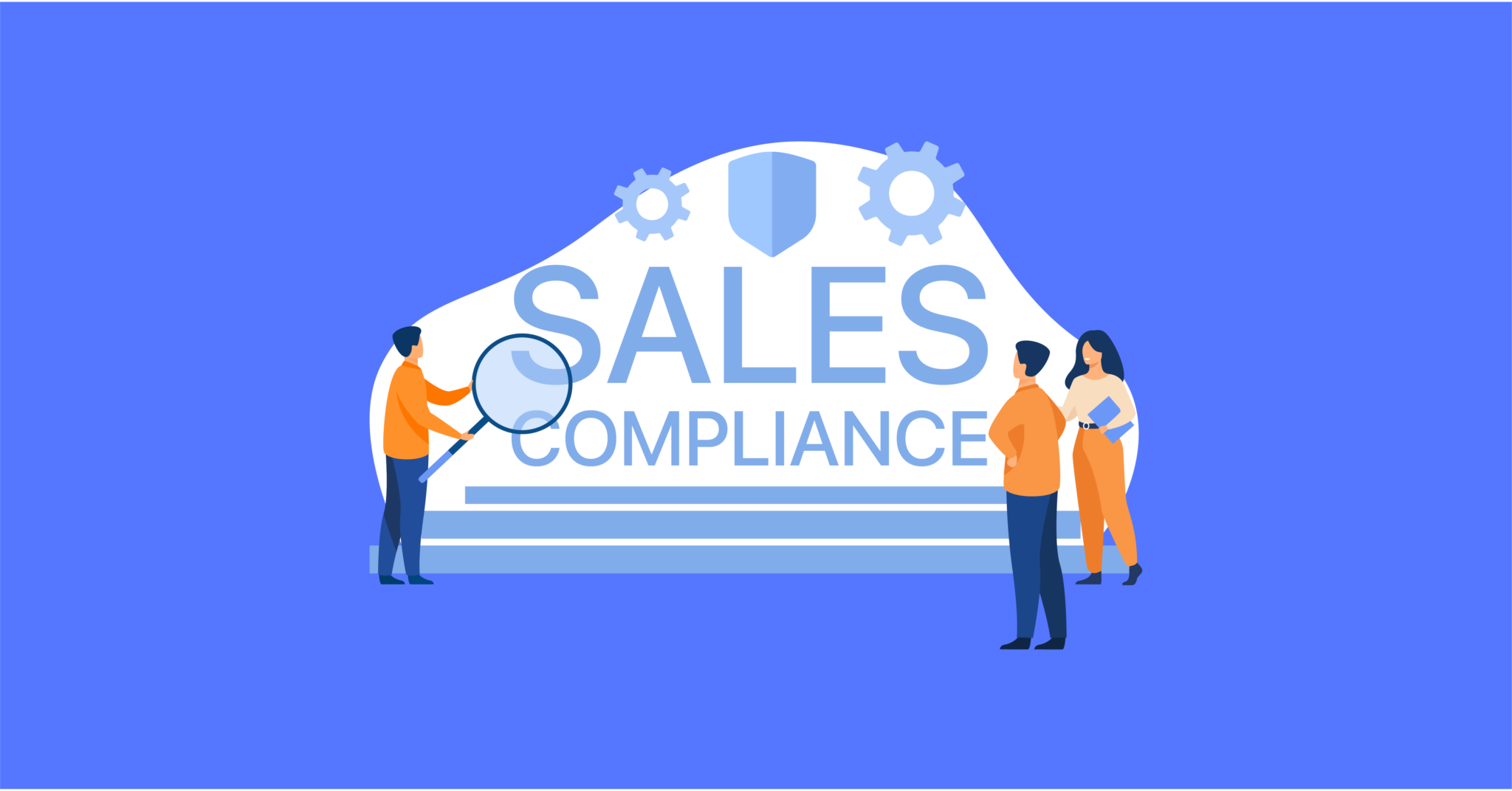What is Sales Communication Compliance: Definition & Best Practices

Sales and marketing compliance means your consumer-facing communications follow the law and your internal policies. That includes web pages, landing pages, paid ads, emails, texts, social posts, sales scripts, affiliate placements, and call center interactions. Most organizations must manage core federal rules such as UDAAP, Truth in Lending (Reg Z), RESPA (Reg X), Equal Credit Opportunity (Reg B), CAN-SPAM, TCPA, and in wealth management, SEC Regulation Best Interest and FINRA Rule 2210. The practical playbook is simple: establish policies and disclosures, pre-approve what needs review, monitor every channel, document everything, remediate fast, and continuously train your teams and vendors.
Sales compliance is ensuring that all of your organization’s sales communications follow the rules set by the government. Many of these standards are put in place to protect consumers from being misled or deceived by businesses, especially financial institutions. In practice, sales compliance is making sure that communications are in line with the appropriate regulations across all touchpoints in which you communicate directly with a consumer. Whether it be through email, social media, on the phone or via messaging, organizations are responsible for making sure that messaging by their sales representatives is accurate, truthful and abides by all applicable regulations.
Why Is Sales Compliance Important?
Sales communications are an extension of your marketing communications but there are two main differences when it comes to compliance monitoring. First is that, with sales communications, a sales rep is typically speaking directly to only one or a few people, rather than a larger audience. Second, monitoring involves reviewing communications by many individual sales professionals as opposed to one central hub for marketing content. These communications are not immune to regulatory scrutiny, as they still fall under the same rules and regulations as any marketing materials would. Failure to meet these regulatory obligations could result in regulatory scrutiny and enforcement actions against your company.
For those in consumer lending, sales compliance is especially important. Mortgage loan officers and wealth advisors, for example, often work with consumers directly. It’s important that consumers are given accurate information. Under the Truth In Lending Act (TILA), this includes information like the amount financed, finance charges, payment schedules, a total of payments, annual percentage rates (APRs) and security interest disclosures. If any of these are not disclosed properly, the creditor is liable and will likely hear from the regulators.
Where Should You Look For Sales Compliance?
There are several places in which your sales team might be communicating with consumers:
Call Centers and Messaging
What agents or sales reps are telling consumers either over the phone or via messaging must be within regulations. They should also be adhering to scripts and handling objections properly according to company guidelines.
Emails and Texts
One-on-one email communications or text messages between salespeople and consumers can be a blind spot when it comes to compliance. Although these are more personal and private communications compared to a marketing email campaign, these consumers still must be given accurate information and the content must comply with regulations.
Web and Social Media
While most communications on the web or Social Media can be considered marketing compliance, social accounts or web pages for individual contributors could be categorized under sales compliance since they are communicating directly with consumers. An example of this would be a mortgage loan officer or a wealth advisor that has their own practice in conjunction with a larger organization.
Definition: Sales vs. Marketing Compliance
Sales compliance governs one-to-one or small-audience interactions driven by people, such as emails, SMS, DMs, phone calls, and conversations handled by individual reps or advisors.
Marketing compliance governs one-to-many communications like web pages, paid ads, social content, and campaigns managed by central marketing teams or agencies.
Both fall under many of the same consumer-protection rules. The key difference is scale, messaging control, and recordkeeping across many individuals versus central assets.
Why It Matters
• Regulatory risk: civil money penalties, restitution, and remediation costs for violations.
• Brand risk: misleading or non-compliant claims erode trust and fuel complaints.
• Operational risk: fragmented channels and vendors make supervision and proof of compliance difficult.
• Revenue impact: compliant messaging improves clarity, reduces friction, and speeds approvals.
Where Compliance Risks Hide
• Unsubstantiated performance claims or superlatives in ads and social posts.
• Missing or incorrect disclosures on product pages, landing pages, or sales scripts.
• Incentivized or employee reviews without clear disclosure.
• Text or dialer campaigns without the right consent or opt-out mechanics.
• Affiliate, partner, or lead-gen pages that deviate from approved language.
• Inconsistent rate, fee, or eligibility language across microsites and sales collateral.
• Improper audience targeting or discouragement that raises fair lending concerns.
Program Checklist: Build, Run, Improve
□ Document the rules: your policy library that maps channels to the governing regulations and required disclosures.
□ Approval workflows: what requires pre-review, who signs off, and how to version and expire content.
□ Disclosures: standard, pre-approved statements for rates, eligibility, testimonials, endorsements, and influencer posts.
□ Consent management: channel-specific consent capture and revocation for email and SMS, with logs.
□ Monitoring: automated discovery and review across web, social, ads, sales emails, SMS, and calls.
□ Vendor oversight: contracts, onboarding requirements, and periodic audits for agencies and affiliates.
□ Recordkeeping: retention windows, evidence of approvals and monitoring, and audit trails.
□ Remediation: severity scoring, time-to-fix SLAs, and corrective training.
□ Training: role-specific enablement for marketers, sales reps, and partners, refreshed routinely.
□ Reporting: compliance KPIs, issue trends, and board-level dashboards.
Common Violations & How to Prevent Them
• Misleading rate or fee claims: require substantiation and approved language.
• Missing equal opportunity or licensing disclosures: build into templates and profiles.
• Improper endorsements or reviews: require clear, conspicuous disclosure of material connections.
• Email without opt-out or accurate headers: enforce CAN-SPAM templates and suppression lists.
• Texts without proper consent: enforce TCPA-compliant consent capture and retention of evidence.
• Discouraging or discriminatory advertising: review targeting and copy for fair lending risks.
• Unsupported superlatives and guarantees: require evidence or remove the claim.
Sales Compliance Doesn’t Have To Be Difficult
Ensuring sales compliance can seem overwhelming, but it doesn’t have to be. Technology can automate the monitoring and remediation of your organization’s sales communications with consumers. With the help of an automated omni-channel platform, potential compliance issues can be automatically discovered, tracked and remediated across all of these sources.
PerformLine helps organizations of all sizes monitor their sales communications and content across the web, email, messaging, calls and social media for regulatory and brand compliance to mitigate risk and ensure brand safety.
If you’d like to learn more about monitoring your sales communications for compliance, our experts are ready to help.
FAQs
It is the practice of ensuring that every consumer-facing message complies with applicable laws and your internal policies. It spans centralized marketing assets and one-to-one sales communications.
Sales compliance governs one-to-one messages by people. Marketing compliance governs one-to-many assets. The rules often overlap, but workflows, approvals, and recordkeeping differ.
Core rules include UDAAP, Truth in Lending Act and Regulation Z, RESPA and Regulation X in mortgage, ECOA and Regulation B, the FTC Endorsement Guides, CAN-SPAM for email, TCPA for calls and texts, and in wealth management, SEC Reg BI and FINRA Rule 2210.
Yes. Disclose any material connection clearly and conspicuously and avoid deceptive review practices.
It is the Brands responsibility to educate partners about disclosure requirements, include compliance clauses in contracts, review content before publishing, and monitor ongoing influencer activities. Influencers must follow disclosure guidelines every time they endorse a brand.
If they promote products or services, yes. Apply the same standards you would for ads, including required disclosures and prohibitions on misleading claims.
Retention depends on your industry and regulator. Maintain approvals, disclosures, monitoring evidence, complaints, and remediation logs for the applicable window and consult counsel for specifics.
Automation should handle discovery, triage, and evidence capture. Human review remains essential for judgment calls and legal interpretation.
Brands use automated tools, like PerformLine, that track and flag missing disclosures or compliance issues, offer clear campaign guidelines, and provide reports. Regular audits and ongoing education also help maintain standards.
Updated: Dec 2, 2025



